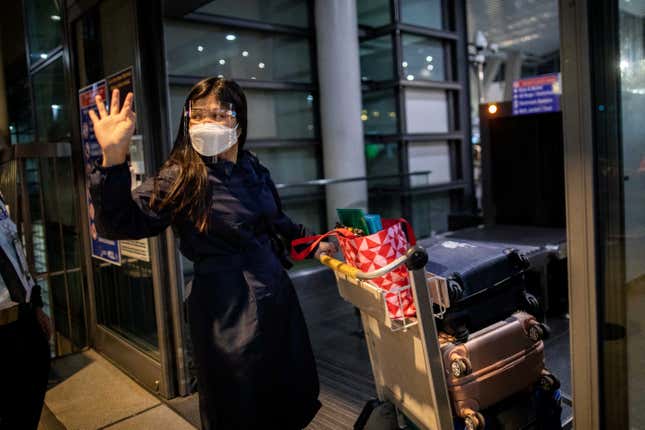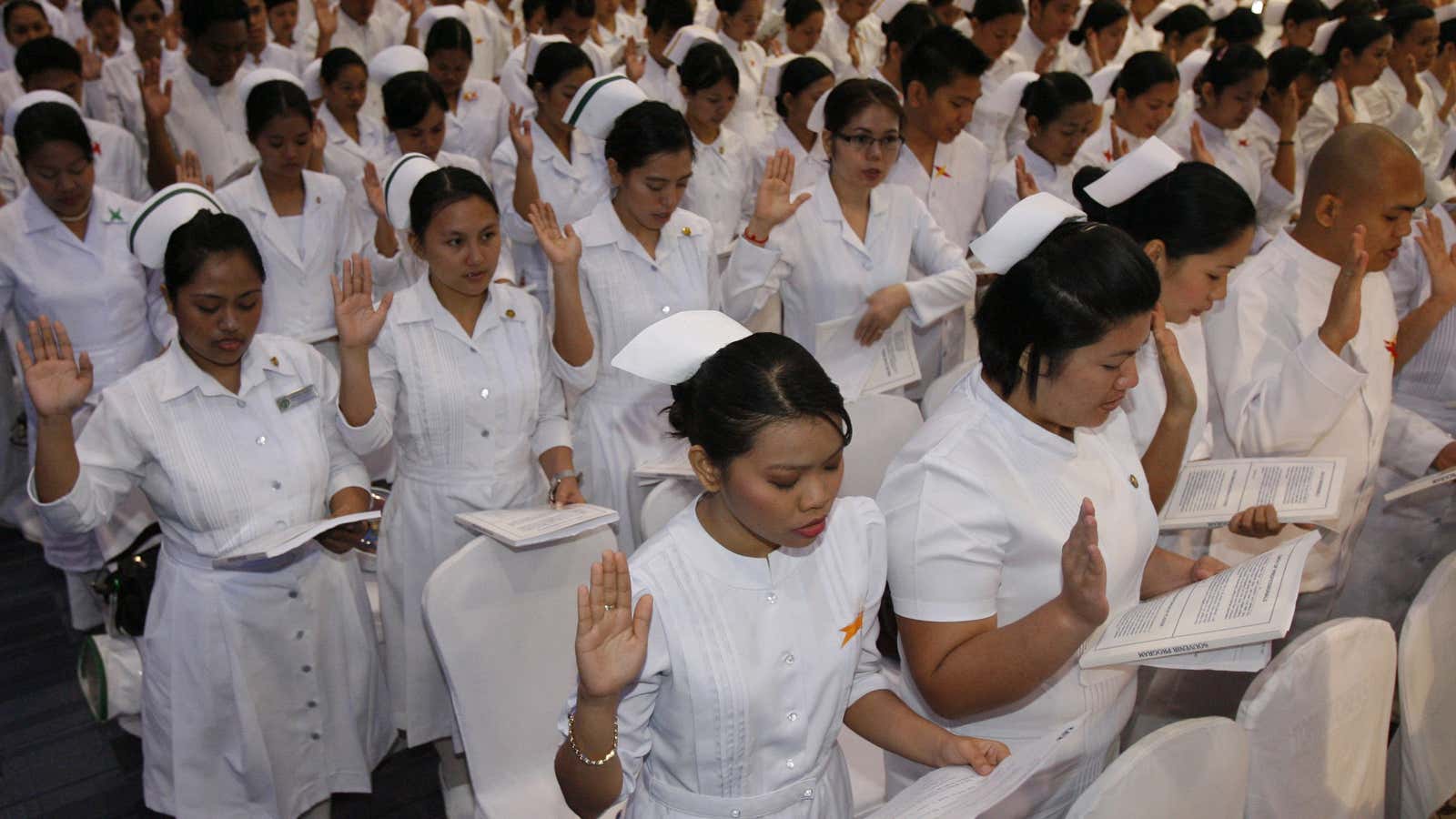The Philippines is using two coveted resources of the Covid-19 pandemic as bargaining chips: healthcare workers and vaccines.
The Philippine Department of Labor and Employment says it’s willing to exempt the Germany and the UK from the 5,000–person annual limit on the number of Filipino healthcare professionals allowed to work abroad. In exchange, they want to secure 600,000 doses of the Covid-19 vaccine, and also review bilateral labor agreements.
Germany and the UK face a dire shortage of trained caregivers for their aging populations, so they need the nurses. A recent study suggests that the UK may require 50,000 more nurses over the next four years to survive the pandemic. Germany has been actively recruiting foreign nurses to fill thousands of open positions across the country, and is ready to hire 15,000 new Filipino medical workers.
In a Feb. 22 briefing streamed on Facebook, Alice Visperas, the department’s international labor affairs bureau director, explained that donated vaccine doses will be reserved for repatriated Filipino laborers who wish to return to their jobs abroad. “Many countries who hire Filipino workers expect them to be vaccinated,” she explained. “There may even come a time when they won’t be allowed in those countries without it.”
Visperas says both the UK and Germany have been open to their terms, and expect a decision over the next few days. Inoculating its migrant worker sector is a priority for the Philippines government, given that their remittances alone account for 11% of the country’s entire GDP.
Nursing unions are divided over the labor department’s quid-pro-quo proposal. The Philippines Nurses’ Association is amenable to the idea if it garners extra resources for the country, which is grappling to secure vaccines for its population, including frontline health workers who treat an average of 1,700 daily Covid-19 infections.
A Filipino nurse, who declined to be identified by name, told Quartz that she’s supportive of the plan. “As a practicing staff nurse in a government hospital who has has experienced the full impact of this pandemic, I perceive that the government is making decisions for the people’s common good,” she says. “I think it’s a win-win situation. Nurses who want to go abroad will get what they want, and even if the country has fewer healthcare workers, at least we’ll be closer to herd immunity [because of the vaccines].”
But Filipino Nurses United, a rights advocacy group, says it finds the arrangement appalling. “We are disgusted that the government is treating us like commodities or export products,” it said in a press statement. “These are two separate issues. If nurses want to work abroad, it’s well within their rights. Don’t use them as trading pawns. If we need vaccines, the government should go through the [procurement] process.” (Translated from Filipino.)
The plight of #PrisoNurses
With thousands of new graduates each year in the Philippines, an estimated 200,000 registered nurses are unemployed or underemployed. Those who do secure a position in Philippine hospitals earn no more than $500 a month, with many forced to agree to short-term contracts with no benefits. This drives many to seek jobs in the Middle East, Europe, and the US. Nurses in the UK, in comparison, take home an average of $4,000 monthly. Those in the US can earn up to $5,000 a month, although there Filipinos account for a third of the total Covid-19 deaths among nurses.
Last April, soon after the World Health Organization declared that the coronavirus was a global health crisis, the Duterte government barred all migrant workers from leaving the Philippines. Hundreds of nurses bound for foreign hospitals were stranded at home when their work permits were suddenly canceled. The ban on overseas workers was eventually rescinded in May, except for one category: healthcare workers.
The government argued that it needed its world-class medical corps to serve in local hospitals and health centers, which were, at that time, overwhelmed by Covid-19 patients. It offered a $600 monthly wage, plus a $10 hazard allowance.

Unable to make ends meet, nurses in limbo formed a group called #PrisoNurses, alluding to how they felt trapped by the deployment ban.
Among them is April Glory, who was slated to leave for the Birmingham Children’s Hospital in the UK. Stranded in Manila, she opened a small store and took shifts at a call center when the paltry wage offered by the government proved untenable. In an interview with Laura Sanders, a lecturer at the University of Wolverhampton, Glory said that she had no qualms about heading to the UK, even though Covid-19 was spiking there at that time.
The pandemic has ravaged the Philippines. Second only to Indonesia in terms of new infections, there have been 12,000 deaths, despite one of the longest and strictest lockdowns in Asia. The government has yet to announce a mass vaccination scheme. The delay is partly due to a legal issue, with Pfizer and other drug manufacturers waiting for the senate to pass an indemnity clause that prevent lawsuits like a 2018 case when the French drugmaker Sanofi was sued for deaths associated with its anti-dengue vaccine.
“There is no safe place anywhere right now, but the truth is we’re willing to take that risk. In the UK, we know that we’ll be taken care of, unlike here,” Glory explained, alluding to the shortage of personal protective equipment (PPE) for medical personnel in the Philippines. “It’s a shame to tell that because I really love the Philippines…but if I don’t go, there is nothing for my family.”
